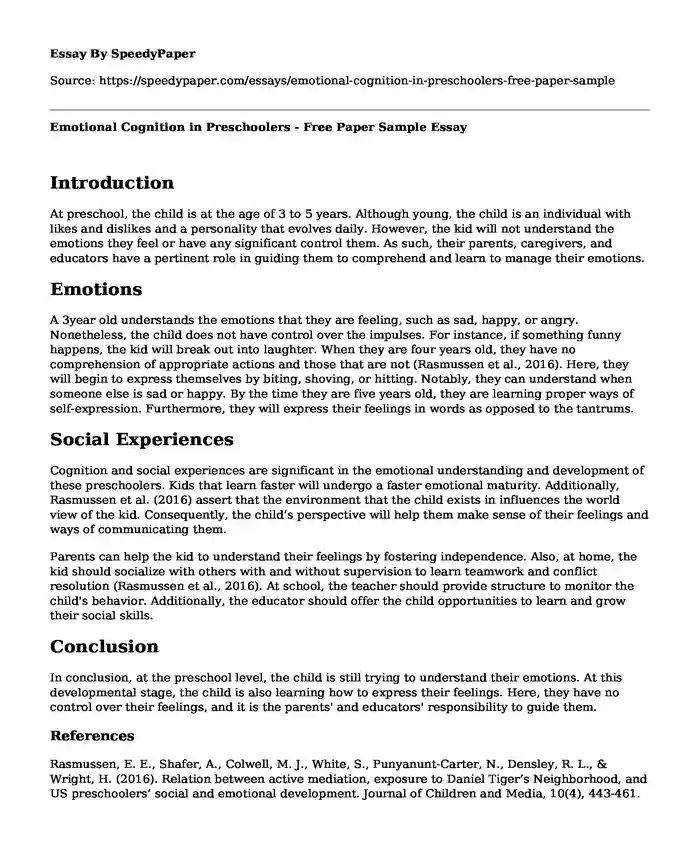
| Type of paper: | Essay |
| Categories: | Psychology Intelligence Child development |
| Pages: | 2 |
| Wordcount: | 399 words |
Introduction
At preschool, the child is at the age of 3 to 5 years. Although young, the child is an individual with likes and dislikes and a personality that evolves daily. However, the kid will not understand the emotions they feel or have any significant control them. As such, their parents, caregivers, and educators have a pertinent role in guiding them to comprehend and learn to manage their emotions.
Emotions
A 3year old understands the emotions that they are feeling, such as sad, happy, or angry. Nonetheless, the child does not have control over the impulses. For instance, if something funny happens, the kid will break out into laughter. When they are four years old, they have no comprehension of appropriate actions and those that are not (Rasmussen et al., 2016). Here, they will begin to express themselves by biting, shoving, or hitting. Notably, they can understand when someone else is sad or happy. By the time they are five years old, they are learning proper ways of self-expression. Furthermore, they will express their feelings in words as opposed to the tantrums.
Social Experiences
Cognition and social experiences are significant in the emotional understanding and development of these preschoolers. Kids that learn faster will undergo a faster emotional maturity. Additionally, Rasmussen et al. (2016) assert that the environment that the child exists in influences the world view of the kid. Consequently, the child’s perspective will help them make sense of their feelings and ways of communicating them.
Parents can help the kid to understand their feelings by fostering independence. Also, at home, the kid should socialize with others with and without supervision to learn teamwork and conflict resolution (Rasmussen et al., 2016). At school, the teacher should provide structure to monitor the child's behavior. Additionally, the educator should offer the child opportunities to learn and grow their social skills.
Conclusion
In conclusion, at the preschool level, the child is still trying to understand their emotions. At this developmental stage, the child is also learning how to express their feelings. Here, they have no control over their feelings, and it is the parents' and educators' responsibility to guide them.
References
Rasmussen, E. E., Shafer, A., Colwell, M. J., White, S., Punyanunt-Carter, N., Densley, R. L., & Wright, H. (2016). Relation between active mediation, exposure to Daniel Tiger’s Neighborhood, and US preschoolers’ social and emotional development. Journal of Children and Media, 10(4), 443-461.
https://www.tandfonline.com/doi/abs/10.1080/17482798.2016.1203806?casa_token=m7BHqfdUO0AAAAA%3Ad5uvtVp93_y4pWljf7e8ZiQQBR1nehRFS_FxmDl15iZP33nqeMeQFeCMTkXi4knMSJuhoZ8j0E7iEHtg&journalCode=rchm20.
Cite this page
Emotional Cognition in Preschoolers - Free Paper Sample. (2023, Nov 24). Retrieved from https://speedypaper.net/essays/emotional-cognition-in-preschoolers-free-paper-sample
Request Removal
If you are the original author of this essay and no longer wish to have it published on the SpeedyPaper website, please click below to request its removal:
- Essay Example on Abortion Experience
- Free Essay on Organizational Citizenship
- Was Henry Ford a Good Manager? Essay Sample
- Essay Sample on the Issue of Recruitment of American Veterans in the Workplace
- Essay Example: Layoffs in Human Resource Management
- Free Essay: Sexual Orientation and Gender Identity
- Essay Example on Audience: Children
Popular categories




